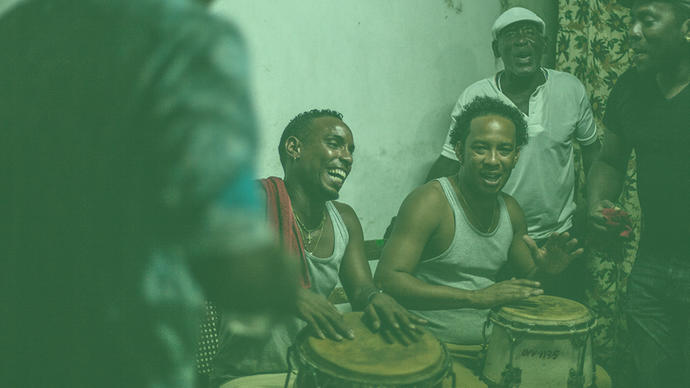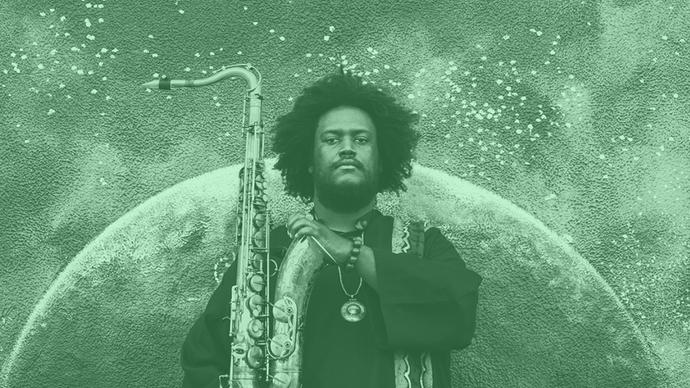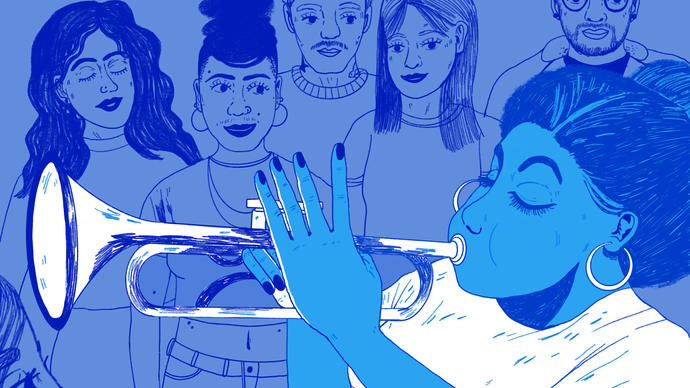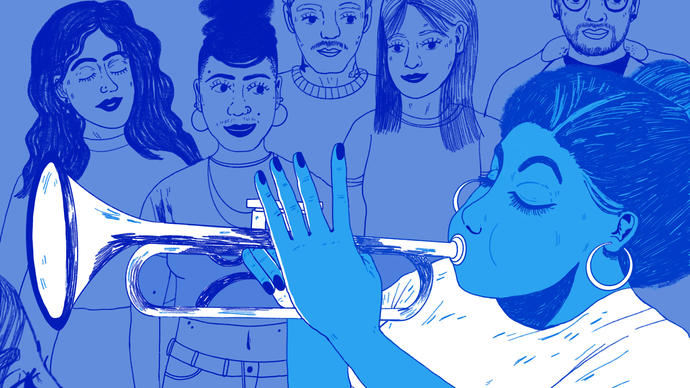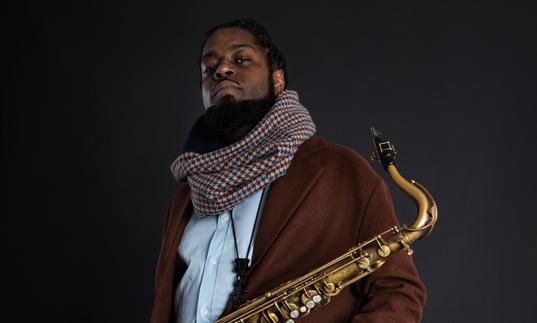Placed on the same line-up, Balimaya Project and Colectiva appear as foils to one another; two large set-ups, one with only men, the other all-women. Both supposedly ‘fusing’ jazz with something ‘other-worldly’. These are the obvious and shallow comparisons that some may make between these two groups. Though perhaps it might also be misleading to speak of them as merely ‘groups’: they are projects which have emerged out of a greater impulse — an agenda if you will — that goes beyond the writing and performing of music for enjoyment. There is a particular self-awareness in the formation and performance of both Balimaya Project and Colectiva, the complexity of their rhythmic lineages that makes their inclusion on this line-up together not just interesting, but necessary.
Balimaya Project is a sixteen-piece outfit that was formed in 2019 by percussionist Yahael Camara Onono, a second-gen Londoner with roots in Casamance and Nigeria. In creating a space for the traditions and significance of West African rhythms and culture to exist beyond lazy categorisations of Afro-diasporic music – ‘afro-jazz’, ‘afrobeat(s)’, or ‘world music’ – Balimaya Project centres folkloric music with specificity, confidence and integrity. Onono says, ‘It’s like a rap group, but playing traditional music’, developing something he calls ‘Mandé-jazz’, where lineage, folklore and musicianship are inextricably linked. It is the interplay between these three elements that Balimaya Project does so well, with an acute understanding that for something to be authentic, it needn’t be static. Indeed, culture and instruments themselves are alive and evolving across time and space, both on the African continent and throughout the Diaspora. Balimaya Project’s music is built for the groove, for the folklore, but most notably, the music is built for the instrumentation. A track like ‘Anagofoli’ showcases what can happen when three talking drums, a drumkit, djembe and dounoun are given the sonic and epistemic space to flirt with and step-into the full breadth and possibilities of what we simply call ‘percussion’. Onono asserts, ‘Just because we call something percussion doesn’t do anything justice. A piano is percussion and it plays a hugely different role; djembe and congas are lead instruments, and talking-drums as well are solo-instruments played by soloists and normally only played by soloists that have the dexterity and the skill to play the instrument to its full effect.’ Balimaya Project foregrounds the significance of folkloric instrumentation in its own right across the Diaspora and situates it in conversation with this thing we call ‘The London Jazz Scene’, without needing to transpose instrumentation into western understandings of rhythm and arrangement. The kora, talking-drums, djembe, balafon, dounoun, engage with the rhythm section and horn-line on their own terms, in ways that open up new avenues for the latter. Balimaya Project’s understanding and expressions of polyrhythm is at once ecstatic, and gentle, and furious, and dare I say, sexy! The Project is not born from loss or a searching to answer some cultural insecurity of the members’ positions in their respective diasporic communities. Not at all! Onono maintains that every member of the band is a gatekeeper in their own right and musical lineage. They’re not trying to convince you, or themselves, of nothing!
Alongside Mandé polyrhythm, Afro-Cuban percussion is also one of the more complex rhythmic cultures in the world. It is the latter that Colectiva find themselves immersed in. A porous collective, rather than a band with a fixed line-up, Colectiva perform in different set-ups ranging from a twelve-piece to a seven-piece band playing what they jokingly term ‘tropicaliente’, a merging of Afro-Latin rhythm, salsa and contemporary jazz harmony. Initiated by Viva Msimang, Colectiva is anti-hierarchical in arrangement and structure. They exist as a pool in which women instrumentalists have come together through their love of and appreciation for various Afro- Latin genres and compose collaboratively. Whilst Msimang rejects the label of band-leader, she admits that it’s her love for Fania Records and the interrelationships of musicians across the Afro-Latin salsa and jazz scenes of 50s/60s/70s New York that generated the thread that holds the collective together throughout its evolution. She states; ‘wouldn’t it be amazing if we
could have a renaissance or creation of that kind of space here in London and bring these communities together that actually share so much in common. Not just today, but in terms of our histories… This music has its roots in Africa 100%, both jazz and salsa and all these Latin American styles.’ Whilst the whole band isn’t Latinx, many of Colectiva’s members come from migrant families, whether it's Chile, Venezuela, Colombia or South Africa. Beyond what might seem like a romanticisation of mid-century New York lies a very real critique of the separation of people and communities in London, especially with regards to some of the ways music is experienced and performed across the city. Msimang explains; ‘The Latin scene has been dominated by function-style events where dancers, usually from outside of the community, will go to do their dance classes. There’ve been a lot of Latin musicians who have been somewhat relegated to playing essentially cover songs for this type of event. While this scene has provided a lifeline for many musicians, the conditions are often bad, there’s no real exposure, and people aren’t writing new music. There’s exceptional musicianship in these projects, but there hasn’t been enough of a platform for creativity.’ Indeed, this is something that’s changing, and Colectiva is an example of the kind of intentionality that is required to bring contemporary and original Afro-Latin music to new audiences in the city. Tackling representation of sonic traditions, Colectiva also comprises of a strong network of women leaders addressing the gender imbalance on the scene; an ‘ode to sisterhood and the healing power of music’. Whilst it was not intentional for Balimaya Project to be an all-male outfit (folklore doesn’t dictate that women are not allowed to play), Onono was intentional in creating a majority Black band. Engaged in their own complex questions of representation, Onono states, ‘I feel like if we’re doing African diasporic music, it should be represented by the African Diaspora. I think that’s only right and I’m very unapologetic in that’. Furthermore, Balimaya Project is engaged in a considered dance with their masculinity. They question what it might mean to celebrate Black men, hyper-visible and excelling in traditionally white spaces, as a brotherhood and as a family that is emotionally available to one another and their audiences, playing music that is simultaneously aggressive, sensitive and delicate; an exploration of a nuanced Black masculine communion that we seldom see on stage.
Whilst both Colectiva and Balimaya Project seem to hyphenate their project and sound to something as amorphous as ‘jazz’, their use of the term is reminiscent of music styles emergent in Burkinabè and Guinean music of the 50s and 60s. Equally influenced by Afro-Latin and Mandé musical traditions, this era in Burkina Faso coined the genre ‘tropical jazz’ with groups like Volta Jazz who were never really playing western conceptions of jazz at all. Rather the use of ‘jazz’ here spoke, and continues to speak, to a sense of contemporaneity – where the spirit of African and Black sonics find vitality today.
Words by Zara Julius of KONJO.

